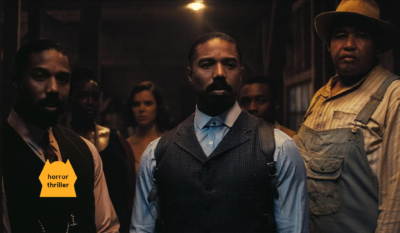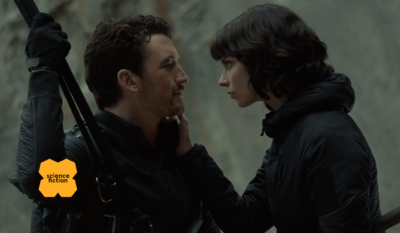A homeless young gay man enlists in the Marines as a way out of his struggle in The Inspection. As he goes through boot camp, he grapples with his masculinity and queerness.


The Inspection is a deeply personal look into a queer Black man's experience in Marine boot camp and how his struggles lead him to a deeper understanding of his identity. Writer-director Elegance Bratton never lingers on his characters' misery. Instead, he focuses on their hope and strength. The result is a deeply felt and emotional but ultimately uplifting and entertaining character study of masculinity, queerness, and love. Anchored by an electrifying Oscar-worthy performance from Jeremy Pope, The Inspection is an electrifying introduction to a new voice.![]()

Among the many emotional scenes in The Inspection, a standout shows Ellis French (Jeremy Pope) comforting Ismail (Eman Esfandi), a fellow Marine recruit, when he breaks down in the bathroom in the midst of boot camp. Ismail, a practicing Muslim, sinks into the embrace of French, who is gay. As Ismail cries about wanting to be home, French stares out into the distance with tears slowly filling his eyes. Two people from two different worlds bonding over their shared trauma as outsiders in a world that is not built for them.
ADVERTISEMENT
When we first meet French, he's staying in a homeless shelter in Trenton, New Jersey. And even then, we can see how writer-director Elegance Bratton is setting this story apart from others of its ilk. Throughout the movie, he never lingers on French's misery. Rather, he focuses on his hope and strength. As he journeys into New York City to see his estranged mother (Gabrielle Union), we see him say goodbye to his group of friends—an split second insight into how queer friendship gets us through adveristy. We see it again as an elder gay man in the homeless shelter gives him advice “from an old queen to a young one.”
That energy continues even when we learn that French's mother strongly disapproves of his sexuality. We see this in actions instead of words—she covers her couch in newspaper before he sits, crucifixes hang on the walls of her small apartment. However, he's not here to make amends. He's here to tell her he's made the decision to become a marine. There's an odd glimmer of hope in his voice—but as we learn later, it wasn't exactly a choice. “I've been taking care of myself since I was 16,” he tells Laurence Harvey (Raúl Castillo), a sergeant sympathetic to French's struggles.
When he arrives at boot camp in South Carolina, he's greeted with a barrage of questions from the commander of the unit Leland Law (a towering Bokeem Woodbine) including whether or not they are or have been gay—as if it's something that can just go away. From there, the movie turns into a Full Metal Jacket retelling set in the “don't ask, don't tell” era as the members of the unit are subjected to intense physical, mental, and emotional training—or is it abuse?
ADVERTISEMENT
While much of it is difficult to watch—Woodbine's domineering performance easily strikes fear into your heart—the story never makes the pain a focus.
Rather it's meant to move the plot forward and characters along in their journey. When French's queerness is exposed while in the group shower in a gorgeously directed neon-splashed sequence that perfectly captures the sensation of suppressed queer desire, the result is a beating from Harvey (McCaul Lombardi) and a group of recruits at the behest of Commander Law. But even in that brutal moment, Bratton somehow finds the humanity in the sequence—the conflict in Castro's (Aaron Dominguez) face is a focus of the sequence.
The movie continues to alternate between those trying moments and moments of victory. While Law—and the actual law of the land—dictate that French can't be open with his sexuality, he also proves to his fellow recruits that not only is he more than his queerness but that he is more because of it. In a cheer inducing moment, French in preparation for his final evaluation paints the war paint on his face to look more like makeup on a drag queen than that of a soldier, to which Law chides, “French, only you could manage to f*g up war paint.” The audience went wild.
ADVERTISEMENT
Bratton, making his feature film directorial debut, based the story on his own life as a gay Marine recruit. And that personal angle to the story is apparent throughout.
Through the breezy 104-minute runtime, he focuses on specific moments of his journey. The ones that when put together as a tapestry become a fully formed view of the man he becomes at the end of the movie. A man defiant in his queerness, even when it all seems against him. At times, that makes The Inspection seem formulaic. However, I see it as complete. It's a movie from the perspective of a person that has figured it out. That has inspected his own life to find how his traumas have formed him.
In that way, The Inspection is a love letter to Bratton's experience. That's why despite his mother's journey throughout the movie, which finds her at a very similar place to the start, the movie is dedicated to her. That's the action of a person that is healing.
ADVERTISEMENT
More movies, less problems
- Jordan Peele Unleashes the First Trailer for ‘HIM'
- ‘Sinners' is the best movie of the year | movie review
- Romantic sci-fi thriller ‘The Gorge' hits its mark | movie reivew
Hey! I'm Karl. You can find me on Twitter and Letterboxd. I'm also a Tomatometer-approved critic.
💌 Sign up for our weekly email newsletter with movie recommendations available to stream.
ADVERTISEMENT
Hey, I'm Karl, founder and film critic at Smash Cut. I started Smash Cut in 2014 to share my love of movies and give a perspective I haven't yet seen represented. I'm also an editor at The New York Times, a Rotten Tomatoes-approved critic, and a member of the Online Film Critics Society.


Comments are closed.